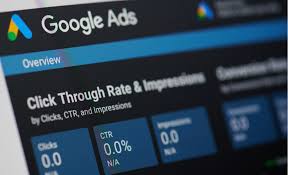The Power of Pay-Per-Click Advertising
Pay-per-click (PPC) advertising is a powerful digital marketing strategy that allows businesses to reach their target audience effectively and efficiently. Unlike traditional advertising methods, PPC offers a cost-effective way to drive targeted traffic to your website and generate leads or sales.
One of the key benefits of PPC advertising is its ability to provide instant visibility for your brand. By bidding on relevant keywords, you can ensure that your ads appear at the top of search engine results pages, increasing the likelihood of attracting qualified leads to your website.
PPC campaigns also offer detailed targeting options, allowing you to tailor your ads based on factors such as location, device, and demographics. This level of specificity ensures that your ads are seen by the right people at the right time, maximising the potential for conversions.
Furthermore, PPC advertising provides valuable data and insights that can help inform future marketing strategies. By analysing metrics such as click-through rates, conversion rates, and cost per acquisition, you can refine your campaigns for optimal performance and ROI.
In conclusion, pay-per-click advertising is a versatile and effective tool for businesses looking to boost their online presence and drive measurable results. With its ability to deliver targeted traffic, instant visibility, and valuable insights, PPC remains a cornerstone of successful digital marketing strategies.
Five Key Advantages of Pay Per Click Advertising: Targeting Precision, Cost Efficiency, Immediate Visibility, In-Depth Analytics, and Budget Flexibility
Three Drawbacks of Pay-Per-Click Advertising: Rising Costs, Competitive Bidding, and the Threat of Click Fraud
- Cost can escalate quickly if not managed effectively
- Competition for popular keywords can increase bid prices
- Click fraud is a potential risk, leading to wasted ad spend
Highly targeted
Pay-per-click advertising offers the significant advantage of being highly targeted, enabling businesses to reach specific audiences based on a variety of criteria such as keywords, demographics, location, and more. This level of precision ensures that ads are shown to the most relevant audience, increasing the likelihood of attracting qualified leads and driving conversions. By targeting specific segments of the market with tailored messaging, businesses can maximise the effectiveness of their PPC campaigns and achieve better results in terms of engagement and return on investment.
Cost-effective
Pay-per-click advertising offers a significant advantage in terms of cost-effectiveness. With this model, businesses only incur charges when a user clicks on their ad, ensuring that each expenditure is directly linked to engagement with the advertisement. This pay-for-performance approach makes PPC a highly efficient and economical method of advertising, allowing companies to maximise their marketing budget by targeting audiences who are actively interested in their products or services.
Instant visibility
One significant advantage of pay-per-click advertising is the instant visibility it offers. With PPC ads securing top placements on search engine results pages, businesses can enjoy immediate exposure for their brand. This prime positioning ensures that your ads are among the first things potential customers see when searching for relevant keywords, increasing brand awareness and driving targeted traffic to your website efficiently.
Detailed analytics
One significant advantage of pay-per-click advertising is the access to detailed analytics provided by PPC platforms. These in-depth data and insights allow businesses to track the performance of their campaigns meticulously. By analysing metrics such as click-through rates, conversion rates, and cost per acquisition, advertisers can gain valuable information to optimise their campaigns effectively. This data-driven approach enables businesses to make informed decisions, refine their targeting strategies, and ultimately achieve better results from their PPC efforts.
Flexible budgeting
One of the key advantages of pay-per-click advertising is its flexible budgeting feature. With the ability to set daily or monthly budgets for PPC campaigns, businesses have full control over their advertising expenditure. This allows for greater financial management and ensures that you can adjust your spending according to your specific goals and resources. Whether you are looking to test a new campaign, scale up existing efforts, or simply stay within a predetermined budget, the flexibility offered by PPC advertising empowers businesses to make strategic decisions aligned with their financial objectives.
Cost can escalate quickly if not managed effectively
One significant drawback of pay-per-click advertising is that costs can escalate rapidly if not managed effectively. Without careful monitoring and strategic budget allocation, businesses run the risk of overspending on campaigns that may not yield the desired results. This can lead to inefficient use of resources and a negative impact on the overall ROI of the advertising efforts. It is crucial for businesses engaging in PPC advertising to set clear objectives, closely monitor performance metrics, and continuously adjust their strategies to ensure cost-effective and successful outcomes.
Competition for popular keywords can increase bid prices
In the realm of pay-per-click advertising, a notable drawback is the escalation of bid prices due to heightened competition for popular keywords. As more advertisers vie for the same high-demand keywords, the cost per click can significantly increase, making it challenging for businesses with limited budgets to maintain a competitive presence in the digital landscape. This phenomenon not only drives up advertising costs but also intensifies the need for strategic keyword selection and budget allocation to navigate the fiercely competitive PPC environment effectively.
Click fraud is a potential risk, leading to wasted ad spend
One significant drawback of pay-per-click advertising is the risk of click fraud, which can result in wasted ad spend for businesses. Click fraud occurs when individuals or automated bots click on ads with no intention of engaging with the content, leading to inflated click numbers and increased costs for advertisers. This unethical practice not only drains advertising budgets but also skews campaign performance data, making it challenging to accurately measure the effectiveness of PPC efforts. Businesses must remain vigilant and implement measures to detect and prevent click fraud to safeguard their ad investments and ensure a more accurate assessment of their marketing ROI.
